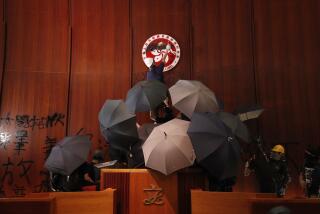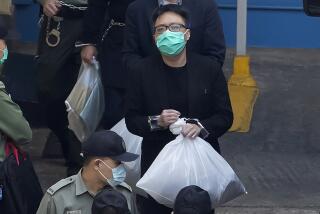In Hong Kong, Occupy protest leaders go free after surrender
Before surrendering to authorities, they were prepared for the worst: immediate arrest, perhaps prolonged detention. As they entered the police station Wednesday, they were jeered by opponents demanding that they be sent straight to jail.
But the three co-founders of Hong Kong’s Occupy movement walked free after what seemed like an innocuous administrative procedure, with police saying they would investigate.
The collective surrender seemed to presage a new — and extremely sensitive — chapter for Hong Kong’s pro-democracy movement: police investigations, possible indictments, trials and sentences for as many as several hundred people.
But as the action begins to shift from the streets to the courts, authorities in Hong Kong — and their superiors in Beijing — are faced with the question of how aggressively to prosecute those who participated in demonstrations that officials have repeatedly denounced as unlawful.
If authorities move gingerly, they risk appearing weak and irresolute, perhaps pumping fresh life into the fading demonstrations. But “if the government simply arrests everyone [and] starts prosecuting them, if they’re too heavy-handed in this, they may cause a resurgence of public protest,” said Michael Davis, a law professor at the University of Hong Kong.
“The problem is that the government has turned this whole thing into a kind of business of courts and the police” by refusing to engage in substantive dialogue with protesters, Davis added, “while the government has taken almost no initiative to address what really is a political problem.”
The organizers of Occupy Central With Love and Peace — pastor Chu Yiu-ming and professors Benny Tai and Chan Kin-man — and 62 other protesters ages 20 to 82 reported to officers Wednesday and admitted to having violated the territory’s statute against unauthorized assembly. The trio have appealed for an end to the protests, which began over moves seen as limiting democracy in a territory that has been promised a degree of autonomy.
With the demonstrations now in their third month and skirmishes between protesters and police flaring regularly, more than 300 participants have been arrested and released on bail. They face charges including assault or obstruction of police, possession of an offensive weapon and unlawful assembly. The latter charge can carry a sentence of up to five years.
Whether more serious charges could be added is an open question. Hong Kong courts have long moved cautiously on civil disobedience charges, but the South China Morning Post reported this week that 200 people were on a list for investigation, citing an unnamed police source. More serious charges such as rioting can carry sentences of up to 10 years.
Protesters aren’t the only ones facing possible incarceration. Seven police officers have been arrested on charges of assaulting a demonstrator in an incident captured on video and could face three years in prison.
Hong Kong’s Western-style legal system, inherited from Britain, is a point of pride for its citizens and the foundation of its status as a global financial center. Supporters as well as opponents of the demonstrations are watching vigilantly for any whiff of political taint in the judicial process.
Last week, after 18-year-old protest leader Joshua Wong was arrested and charged with obstructing the work of a bailiff clearing a protest zone, his attorney, Michael Vidler, accused the court of imposing unusual conditions on the terms of his bail. The limits included barring him from a wide swath of the Mong Kok neighborhood and scheduling his next hearing for mid-January.
Vidler asked for a December court date and alleged that authorities were dragging their feet to prevent Wong from participating in Mong Kok demonstrations.
“The court should not be manipulated,” Vidler told the magistrate, according to local reports. “The real reason for this charge is that my client is a leader of a student organization that is involved in the call for true democracy in Hong Kong.”
In a statement Wednesday after the surrender of activists, police vowed to “handle every case in a fair and impartial manner.”
Most of those who surrendered said they were asked to choose from a menu of possible offenses and provide personal information. How police and prosecutors will proceed is unclear.
“The potential for harassment and invasive searches can be quite great because we won’t know what [evidence] the government is looking for,” said Gladys Li, a human rights attorney in Hong Kong.
“If the government chooses to embark on an exercise of political prosecution in order to deter people from expressing their views, the investigation can be a useful tool” for authorities, she said. “It depends on how far the Hong Kong government, or Beijing, wants to push it.”
Jin Zhong, a Hong Kong-based political commentator and editor of Open Magazine, said he believed it was unlikely that authorities would hand down harsh sentences for protest leaders.
“I think the authorities in Hong Kong and the Communist Party in China have been waiting for this movement to come to an end,” he said. “If they try to punish the student leaders again very harshly, that just gives local residents more reason to go into the streets.”
Those who turned themselves in Wednesday said they hoped their surrender would further the protesters’ aims while showing their respect for rule of law.
“I didn’t surrender out of impulse but my decision to accept the consequences of my participation,” said Fermi Wong, a social worker. “I only hope our government will no longer treat this movement with utter indifference and instead try to fight for the Hong Kong people in facing the Beijing dictatorship.”
“It’s up to the police and the Justice Department as to how to handle us,” said Tai, a law professor. “We’ll wait and see.”
Special correspondent Law reported from Hong Kong and Times staff writer Makinen from Beijing.
Twitter: @JulieMakLAT
More to Read
Start your day right
Sign up for Essential California for news, features and recommendations from the L.A. Times and beyond in your inbox six days a week.
You may occasionally receive promotional content from the Los Angeles Times.







